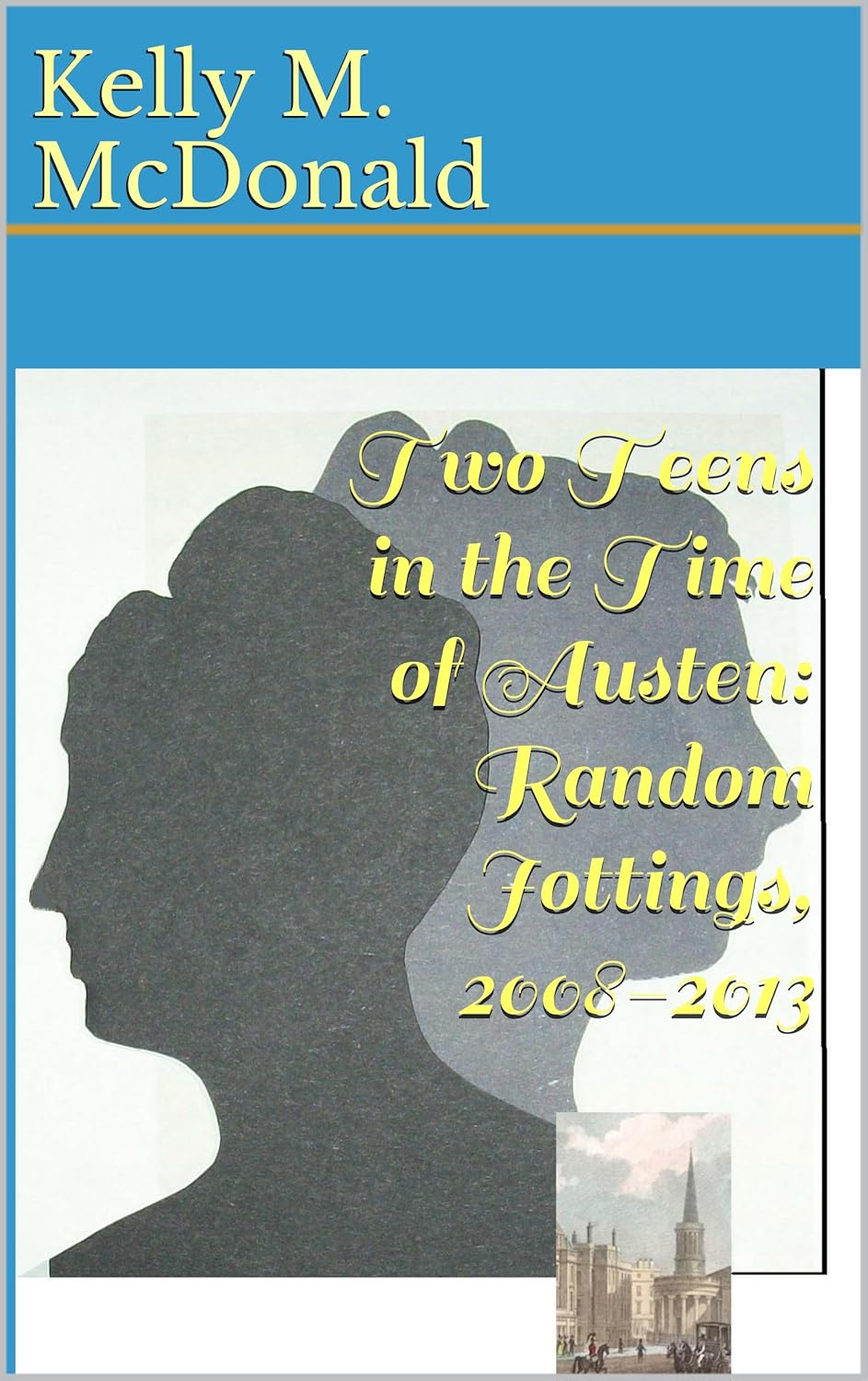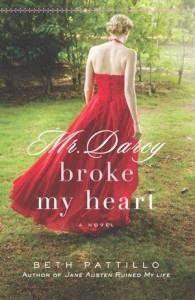
It's no secret that Janeites love Balls.
Hmm, how to make this not sound dirty...
Austen fans love Balls.
Nope.
Who doesn't love a good Ball scene? Almost there.
Whether we like to dance or not, we Janeites can't help but lose ourselves in a brisk reel with a dashing hero — even if only in the pages of a book.
There we go.
We all love a good Ball (
dammit), and the crowded dance rooms of
Pride & Prejudice, Sense & Sensibility and, well, basically every Austen novel are the frequent settings of the most crucial moments in these characters' stories. Kelly M. McDonald, author of
Two Teens in the Time of Austen, is here to talk about the importance and the context of these settings and the requisite London Season, as well as to offer up a copy of her book to one of
you!
Behind the Façade: Anatomy of a Regency London Season
In accepting Mrs. Jennings’ kind invitation to share her London home, Elinor and Marianne Dashwood gained access to the social whirl that constituted “The Season”. This pivotal section of Sense and Sensibility reverses Marianne’s romantic sensibilities: from a path glowing with dreamy sunshine, she walks headlong through storms until face-to-face with death. The cause of this reversal is embodied in Miss Grey, a wealthy young woman whom readers can assume was brought up among the London social circle the Dashwood girls are only visiting. The sole sighting of this rival for Willoughby’s affections is set amidst a glittering social gathering.
At the very least, Jane Austen knew about London’s social milieu through her cousin - the exotic Eliza de Feuillide, who counted among her sisters-in-law (since December 1797) as Mrs Henry Austen. Jane Austen’s letter to her sister Cassandra, dated 25 April 1811, describes an evening entertainment at Eliza and Henry’s Sloane Street residence. “There were many solicitudes, alarms & vexations beforehand of course, but at last everything was quite right. The rooms were dressed up with flowers &c, & looked very pretty.” Musicians arrived, followed by “the lordly Company”. Austen staked out a cool passage area, away from the “hotter than we liked” Drawing Room, which “gave us all the advantage of the Music at a pleasant distance, as well as that of the first veiw [sic] of every new comer. I was quite surrounded by acquaintance, especially Gentlemen”. Eliza’s party was on a slightly modest scale, according to Austen’s telling sentence that “Including every body we were 66 - which was considerably more than Eliza had expected, & quite enough to fill the Back Drawing room”. The party broke up after midnight.
Austen utilizes just such a gathering to quash all hopes Marianne had in meeting Willoughby in London. Chapter 6 (volume II) opens the fateful night on which the girls “attend Lady Middleton to a party”. Austen sketches the scene very lightly, recognizing that contemporary readers already possessed at least passing knowledge of such a setting. “They arrived in due time at the place of destination; and as soon as the string of carriages before them would allow, alighted, ascended the stairs, heard their names announced from one landing-place to another in an audible voice, and entered a room splendidly lit up, quite full of company, and insufferably hot.” There, across the crowded room, first Elinor then Marianne spots Willoughby; they, however, must wait for him to come to them. “He approached; and address[ed] himself rather to Elinor than Marianne, as if wishing to avoid her eye, and determined not to observe her attitude…” After this interview, the girls locate Lady Middleton, who was “in the middle of a rubber” at the Cassino table, and the trio depart the fashionable residence. A break-up - and Marianne’s breakdown - is the inevitable outcome of the evening.
The scene passes quickly, in only a few pages.
Few readers today will have much of a clue beyond Austen’s descriptors of “full” and “insufferably hot” to appreciate the world Willoughby is willingly joining, the milieu which instigated the speedy expulsion of the Dashwood girls -- first back to Mrs. Jennings’ Berkeley Street home, but ultimately back to their country cottage in Devon.
Described by Elinor, who is trying to shield her sister from public embarrassment (and scrutiny), as “not a place for explanations”, what lay behind such gatherings in “room[s] splendidly lit up”? In turning to a handful of contemporary letters and newspaper alerts, the brilliance of “The Season” illuminates how public a stage Willoughby’s coldness towards Marianne is played out upon. Austen utilizes rumor - the stories often originating with the gossip-gathering Mrs. Jennings - to feed readers pertinent back-story knowledge, as well as a few well-chosen red-herrings. It’s a good thing she was too busy attending to her recently-confined daughter, Charlotte Palmer, to attend the Dashwood girls to this party.
So here are Five things for a Regency Girl to keep in mind:
WHEN? “The Season” followed the Parliamentary calendar. On the heels of returning MPs came the wives and daughters. February was a good time to arrive; June would see you departing among the last of the diehard revelers.
WHERE? Think ‘Extravaganza’! Lengthy newspaper articles catalogue the “fashionables”. Titles lead the pack, with Balls opened by Duchesses; Routs hosted by Countesses; and Concerts lead by Marchionesses, but the plain “Mrs” swells the pack. A “splendid Ball and Supper” thrown by one “Mrs” on Portland Place had Fleet Street pens scratching away with superlatives: “The magnificent staircase was lighted up with crystal lamps & the Ball-room illuminated by costly chandeliers and lustres”; “a most excellent banquet consisting of every delicacy”; “dancing recommenced at three o’clock, and was kept up with proper spirit until six” -- SIX A.M., this is.
WHO? Choose your friends well, or work your way up the social ladder. Bigger balls means Bigger Bigwigs, More Impressive Titles, perhaps even The Royals. When in doubt, see “WHERE” above.
HOW? “It’s going to be a bumpy night”: The “string of carriages” took one letter-writer more than half-an-hour to reach the door; a BIG crush once you got inside the door, for this same correspondent only knew a relative was also in attendance by spotting her footman at the entrance. The average party on Portland Place counted three hundred guests. “Scene of Dissipation and Vice”? Indeed.
WHY? Well, Girls just wanna have fun!
****GIVEAWAY****
To go along with her musings on high society and the London season, Kelly has offered up a paperback copy of her book,
Two Teens in the Time of Austen: Random Jottings 2008-2013, to one lucky AIA reader! US only, fill out the Rafflecopter to enter; ends September 6th, 2014 at midnight EST. Good luck!
a Rafflecopter giveaway
ABOUT THE BOOK:

When Elizabeth Bennet captured the attention of Pemberley's wealthy owner Mr. Darcy, Jane Austen's Pride and Prejudice so captured the attention of her sixteen-year-old nephew, James Edward Austen, that he concluded a poem of congratulations addressed to his aunt with,
And though Mr. Collins so grateful for all
Will Lady de Bourgh his dear patroness call,
'Tis to your ingenuity really he owed
His living, his wife, and his humble abode.
The wife chosen by this son of a country clergyman experienced a youth far more stellar than his own, one befitting the wealth a landed-gentleman and Member of Parliament could provide. Emma Smith (1801-1876) and her friend and sister-in-law Mary Gosling (1800-1842), through their personal writings, have left a legacy of their lives dating from Regency London to early-Victorian England. Two Teens in the Time of Austen reconstructs this extended family's biography, as well as recounts the chronicles of a Britain at war and on the brink of great change (social, political, industrial, financial).
England rejoiced in the summer of 1814, for the Napoleonic Wars were presumed to be at an end. This was a momentous year for the Smiths of Suttons and the Goslings of Roehampton Grove. Mary Gosling visited Oxford just as these national celebrations ended. Emma Smith's father had died early in the year, leaving Mrs. Smith a 42-year-old widow: Augusta Smith gave birth to the youngest of her nine children days after her husband's death. Emma began keeping diaries on 1 January 1815. The girls are, at this date, fourteen and thirteen years old. Mary's stepmother hosted dazzling London parties; and Emma's great-aunt hobnobbed with Royalty. The privileged daughters of gentlemen, their teen years are a mixture of schoolrooms, visits, travels to relatives, stays in London during the "Season", and trips to Wales, Ireland, and the Continent -- in fact, the Goslings visit the site of the Battle of Waterloo and Mary has left her impressions of the war-torn region. Here is a tale worthy of Jane Austen's pen, as beaux dance and ladies choose their (life) partners. But happiness comes at a price for many.
Once Emma marries the Rev. James Edward Austen (Jane Austen's nephew), she settles into life as a country clergyman's wife, the mother of a large family. Mary loses her beloved Sir Charles Joshua Smith (Emma's brother) within five years of their marriage. The late 1820s and early 1830s are a difficult time for the family, and the nation also sees much strife, politically and economically. Siblings marry -- more Vicars become sons-in-law; while one only (Denis Le Marchant) mingles in the world of Westminster. Already the family has gone from the horse and carriage into the age of steam; now comes the age of the railway. In one letter, James Edward Austen Leigh writes of his excitement (and trepidation) at riding the rails when the speed gets up to the likes of 35 miles per hour! The early 1840s witnessed the deaths of several vibrant women this story contains: Lady Smith, Eliza Chute, Augusta Smith. Young Victoria is on the throne, but the legacy of George III and his Charlotte has never been forgotten.
Two Teens in the Time of Austen: Random Jottings, 2008-2013 introduces people Jane Austen met -- like the Chutes of the Vyne, as well as the niece she never lived to welcome into the family: Emma Austen Leigh, whose husband would later publish Recollections of the Early Days of the Vyne Hunt (1865) and A Memoir of Jane Austen (1870; revised, 1871).
 |
| Click the button or HERE to return to the Austen in August main page! |













